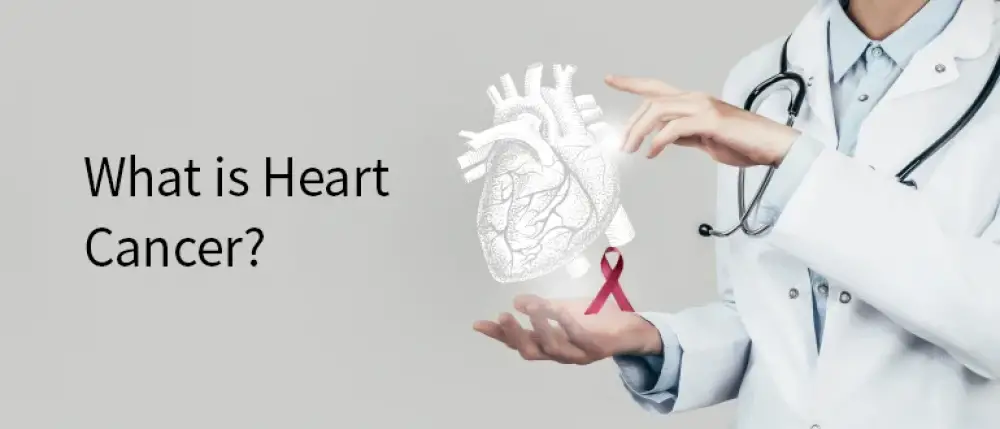Subscribe to get weekly insights
Always stay up to date with our newest articles sent direct to your inbox
Published on 1 May, 2024
Updated on 26 Mar, 2025
2117 Views
4 min Read

Written by Nidhi Goyal
Reviewed by Munmi Sharma
favorite0Like
favoriteBe the First to Like
A young athlete, a body builder or an exercise addict- any of them may have a heart cancer. Yes, cancerous cells may grow in the heart and it can lead to heart failure. However, modern medical science has been exploring ways to cure heart cancer without leaving a chance for its recurrence.
Heart cancer symptoms often get misdiagnosed with cardiovascular disease, potentially leading to incorrect treatment. This article aims to help you avoid such risks by providing comprehensive information on heart cancer, covering its causes, symptoms, diagnosis, and treatment options.
Let's begin!
Similar to other forms of cancer, primary heart cancer is the result of the unchecked genetic mutation in the heart cells that causes cells to grow and multiply. However, this is less commonly seen among heart cancer patients. The most common form of heart cancer is secondary heart cancer. This occurs when the cancerous cells of the other organs move to the heart and cause cancer. For example, the cancerous cells of breast cancer grow and move to the heart and develop cardiac tumors there. This type of malignant heart cancer is also known as metastatic cancer.
Let's look at some of the common heart cancer symptoms:
Some common causes of heart cancer include:
However, angiosarcoma found in blood and lymph vessels is a rare type of soft sarcoma tumour that causes primary heart cancer in patients. Other than this, various types of cardiac sarcomas develop in pulmonary arteries and aorta.
Secondary heart cancer spreads to the heart from another cancerous organ, including the breast, lungs, skin, and kidneys. It finds its way from the cancerous thymus gland that lies in the chest or through the blood vessels called leukaemia and the lymphatic system.
To detect which type of heart cancer has grappled the patient out of different types of heart cancer, the diagnosis is done through various screening tests including:
Check out the following preventive measures to lower the risk of heart cancer:
Avoid carcinogen agents, they are present in tobacco and alcohol. If you wish to quit tobacco, smoking, or alcohol addiction consult a doctor.
Limit processed red meats and incorporate plenty of fruits, beans, and vegetables into your diet.
Be physically active, and do moderate exercises regularly.void a sedentary lifestyle. Avoid excessive sun exposure. Cover your skin or apply sunscreen before coming in contact with the sunlight.
Regular check-ups may be helpful in an early diagnosis.
It is very complicated to cure heart cancer because treatments such as chemotherapy and radiation therapy that are given to the patient cause permanent heart damage. Also, surgical treatment is the first-line treatment that is given to the patient after detecting heart cancer stages. Read on to understand vital heart cancer treatment procedures to prevent the risk of stroke, heart failure, or heart attack:
Sadly, the heart cancer survival rate is not very high even with heart cancer surgery because its symptoms relapse after some time.
Following cardiovascular disease and chronic respiratory disorders, cancer has become increasingly prevalent, ranking as the third-leading cause of premature death. Due to the staggering medical expenses in India, patients affected by cancer are often diagnosed at advanced stages. This often results in a survival rate of only 30% for those diagnosed with malignant cancer diseases.
This is largely because most patients can't afford long-term treatment in multi-speciality cancer care hospitals. A cancer-specific insurance plan is a great financial corpus that will assist one in funding the cancer treatment. Let's look at some reasons that will help you understand why a cancer-specific insurance plan over and above regular health insurance is vital:
Read More: What Are the Steps To Find Out The Best Health Insurance Plans for Cancer Patients?
On account of the expensive pre and post-hospitalisation expenses, surgical interventions, and other treatment costs, many cancer-affected patients remain deprived of treatment at the right time. With a cancer insurance plan, these expenses can be covered without any financial constraint.
Our Cancer Insurance Mediclaim policy can be a good option, which covers all stages of cancer. The policy comes with multiple sum insured options up to INR 1 crore, in-patient and daycare coverage, chemotherapy and radiotherapy up to SI, alternative treatment cover, ambulance cover, annual health check-up and many other features. Connect with our experts for policy details and related terms and conditions.
favoriteBe the First to Like
Thyroid : मामूली नहीं हैं महिलाओं में थायराइड होना, जानें इसके लक्षण और घरेलू उपचार Vipul Tiwary in Diseases
शुगर कंट्रोल कैसे करे? जानें, डायबिटीज में क्या खाना चाहिए Vipul Tiwary in Health & Wellness
हाई ब्लड प्रेशर को तुरंत कंट्रोल कैसे करें? देखें इसके उपाय Vipul Tiwary in Diseases
पैरों में दर्द किस कमी से होता है? जानें, इसके घरेलू इलाज Vipul Tiwary in Health Insurance Articles
Is Cryotherapy Safe? Everything That You Should Know About! Sejal Singhania in Diseases
Understanding Bile Duct Cancer Through Everyday Life Nidhi Goyal in Diseases
Your Guide to Urological Cancer: Types, Symptoms, Treatment & Early Detection Sejal Singhania in Diseases
The Long-Lasting Effects Of Testicular Cancer That You Should Know! Sejal Singhania in Health Insurance Articles
Heart attack, blood clots, heart rhythm issues, stroke, valvular disease, and pericardial inflammation.
Around 6 months if no surgical treatment is given. There are chances of its reversal even after chemotherapy, radiotherapy, and surgical treatment.
It is because the heart cells do not divide with the same speed as they do in other different parts of the body. Hence, heart cancer is less likely to develop.
Always stay up to date with our newest articles sent direct to your inbox
Loading...